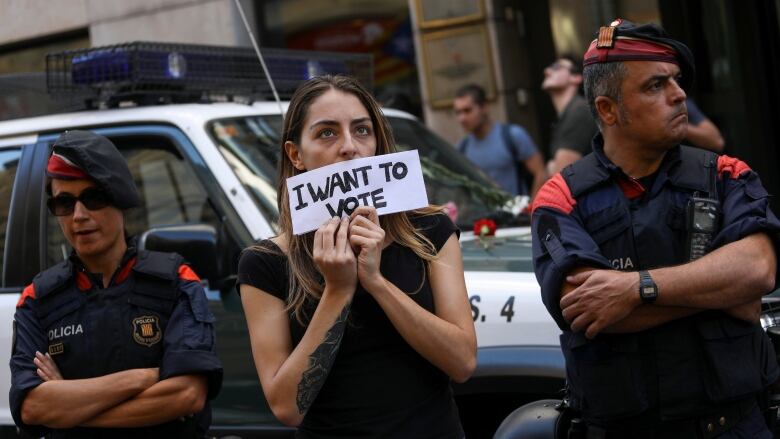Catalans defiant ahead of independence referendum that Spanish government calls illegal

Advocates for Catalan independence say Spain has gone too far in its efforts to suppress a referendum on secession, drawing parallels to the country's authoritarian past.
But those who are pushing for separation say they are undeterred.
"It is the will of more than 80 per cent of the citizenship of Catalonia, that they — we — want to resolve our future in a referendum. So we'll do everything that is possible to let the Catalan people vote," Andreu Francisco, the pro-independence mayor of the Catalan city of Alella, told As It Happens host Carol Off.

Municipal politicians like Francisco have been warned that they may be suspended from office for facilitating the referendum and even risk arrest.
The vote is scheduled for this Sunday, but the central government in Madrid says the referendum is illegal and can't happen.
- Spain's measures to block Catalan referendum criticized by UN rights experts
- Catalonia's right to vote for independence hits close to home for separatist Quebecers
In a statement on Thursday, the United Nations Human Right Council urged Spanish authorities to "respect those rights that are essential to democratic societies."
The statement notes that authorities have searched printing establishments, seized referendum material, blocked websites, stopped political meetings and deployed more than 4,000 police officers to the Catalan region. The UN also expressed concern that leaders of the mass protests have been charged with sedition and about the arrest of politicians.
Francisco says he and other Catalan mayors will do everything in their power to ensure the referendum goes ahead as planned.
"If voting is anti-democratic, we should re-think what democracy is or what democracy is about. Here the only people that [are] destroying the Spanish constitution is the Spanish government right now — violating basic civil rights like freedom of speech, freedom of press, freedom of association," said Francisco.

Francisco says he expects the results of the referendum to be about "half and half" between Yes and No, but that hasn't blunted his conviction that the vote must go ahead.
"We will accept if the No [side] wins," he said. "We are not talking about independence. We are talking about democracy, letting people decide their future."
The referendum is one of the biggest political crises to hit Spain since democracy was restored in the 1970s after decades of dictatorship, and authorities in Madrid have told police to ensure no votes are cast.
Francisco said he has spoken to Catalans who took part in the resistance against the Franco dictatorship who say the current government's actions remind them of that era.
"I've always believed in democracy … it's incredible that we have to act almost clandestinely to let our neighbours vote," he said.
With files from CBC News, Reuters and The Associated Press.